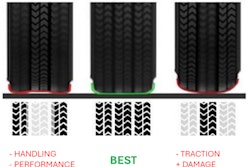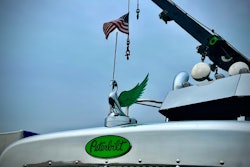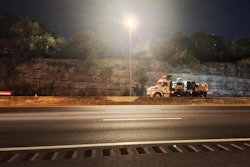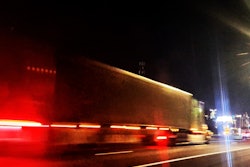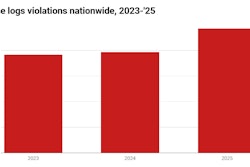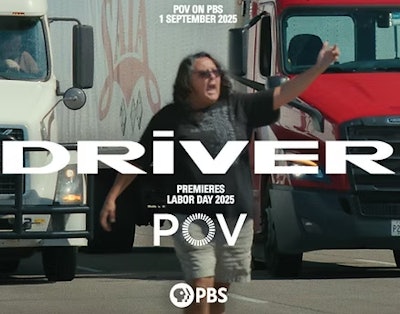
What if an award-winning, New York-based filmmaker approached you and said, “We’d like to do a documentary on you. We’d like to follow you and a few of your friends around for a few years while you’re out there doing what you do."
Then, in short order, someone damages your truck, sidelining it in a shop for sixteen days, as other setbacks pile up. You then realize you’ve just given them a front row seat to some of the most difficult moments of your trucking career. They film you falling behind on your lease payments, losing your truck. They film you being temporarily reduced to homelessness. They film you losing your temper at a receiver. All the while, they’d like to get your thoughts about everything that’s wrong with the trucking industry.
That's in a nutshell the story of what happened when Real Women in Trucking founder Desiree Wood accepted such an offer from filmmaker Nesa Azimi several years back. If you get a chance to see the results in the “Driver” film, its broadcast debut happening on Labor Day on PBS's POV series, don’t miss it. Directed by the Emmy Award-winning Azimi, whose credits also include PBS Frontline, "Driver" is a hauntingly beautiful, slow-cinema treatment of a small group of women who drive trucks for a living.

Evocative of Frances McDormand’s “Nomadland” in some ways, “Driver” brings a contemplative approach to visual storytelling -- long periods of wide-shot trucking silence, its two main characters traversing the big, sometimes mythical-feeling spaces of the American road. It’s an unglossed, firsthand look at how this group of women collaborate to survive. Intermingled with moments of laughter, joy and rage, the film captures the working life of two truckers in depth:
- Wood, the outspoken president of Real Women in Trucking, a group providing advocacy and mentorship for women in transportation.
- Fellow RWIT member Michelle Kitchin, an unfiltered 4-million-mile hauler whose gearjammer superpowers include consuming endless bags of Twizzlers without gaining weight and playfully remonstrating Wood for her trucker ways.
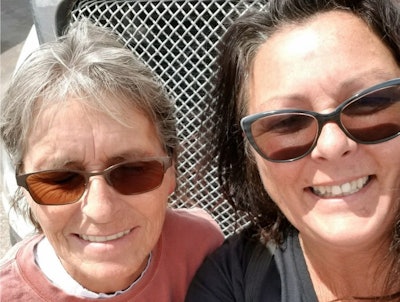 Michell Kitchin (left) and Desiree Wood
Michell Kitchin (left) and Desiree Wood
There’s a truck-stop meet-up scene where the pair cross paths briefly. As they’re walking out, Wood, pressed for time, begins eating her sandwich on the go. Kitchin starts in on her for eating like a trucker. Wood counterpunches by pointing out Kitchin’s large bag of Twizzlers. The scene is as endearingly real as it gets out here.
So much to take away: The relational brevity of it all. The regulated work hours, which too often preclude sitting down for a cup of joe together mid-shift, not to mention the playful antagonism that has characterized the repartee of haulers since before the days of the diesel.
But just making the time to get together, even for a few minutes, perhaps says more about Wood and Kitchin than any other scene in the film. In the end, all we are is the summation of the things we make time for. Wood’s commitment to the RWIT group would eventually be the final nail in the coffin of her owner-operator career. Behind on lease payments, she heads off to attend and lead the third-annual Real Women in Trucking Cruise -- an over-the-water voyage long in the making (speakers booked, plans made well in advance) for the advocacy group.
[Related: How to fight for your right to park the truck]
On the cruise ship and in later scenes, we see faces well-known to regular Overdrive readers: Idella Hansen, Debbie Desiderato, Brita Nowak. Two scenes later we see Wood returning her truck to the leasing company while being greeted by armed security in the lobby. By all accounts she had entered into a high-interest deal on a trouble-prone piece of equipment. After a brutal bus ride, she purchases camping equipment and winds up living in a campground on an air mattress in a tent. While in the tent she reviews a voicemail from a woman who had been raped by a receiver and just needs someone to talk to.
Wood for many years has done substantive work informing public policy on numerous fronts, from advocating early for the Jason's Law parking legislation to underscoring the role of women in transportation. But at what cost?
In one sense, what the film provides is an account of the price of grassroots advocacy. In another, it underscores what Wood today says about the dollars and cents: “I proved that you do not need much money to make a difference," she said. More difficult, though, and what she did, sometimes at the expense of her own circumstances: "You need to put forth effort. Show up, and be prepared.”
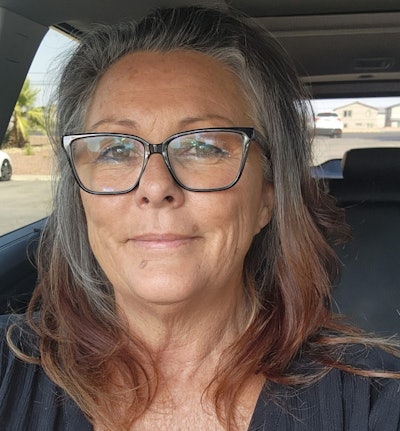 Desiree Wood
Desiree Wood
As noted, though, it's not all costs when it comes to advocacy. Today, Desiree Wood is working for the state of Nevada, and she concluded my brief talk with her with this challenge to those coming up in trucking with a desire to make a difference in the business:
“Now it's time for others to do it if they want to improve their industry. I only showed that you have a choice to do something meaningful and purposeful with your social media influence, or you can hawk makeup, but that really isn't interesting is it?”
My favorite line in the movie is Wood's response to a certain difficult situation: “No one enters trucking from charm school.”
There were moments in the film when the stress that was on her was palpable. I’m glad she got out of that truck before it killed her.
[Related: On the darker side of trucking social media, and making a difference, with Trucker Desiree]

